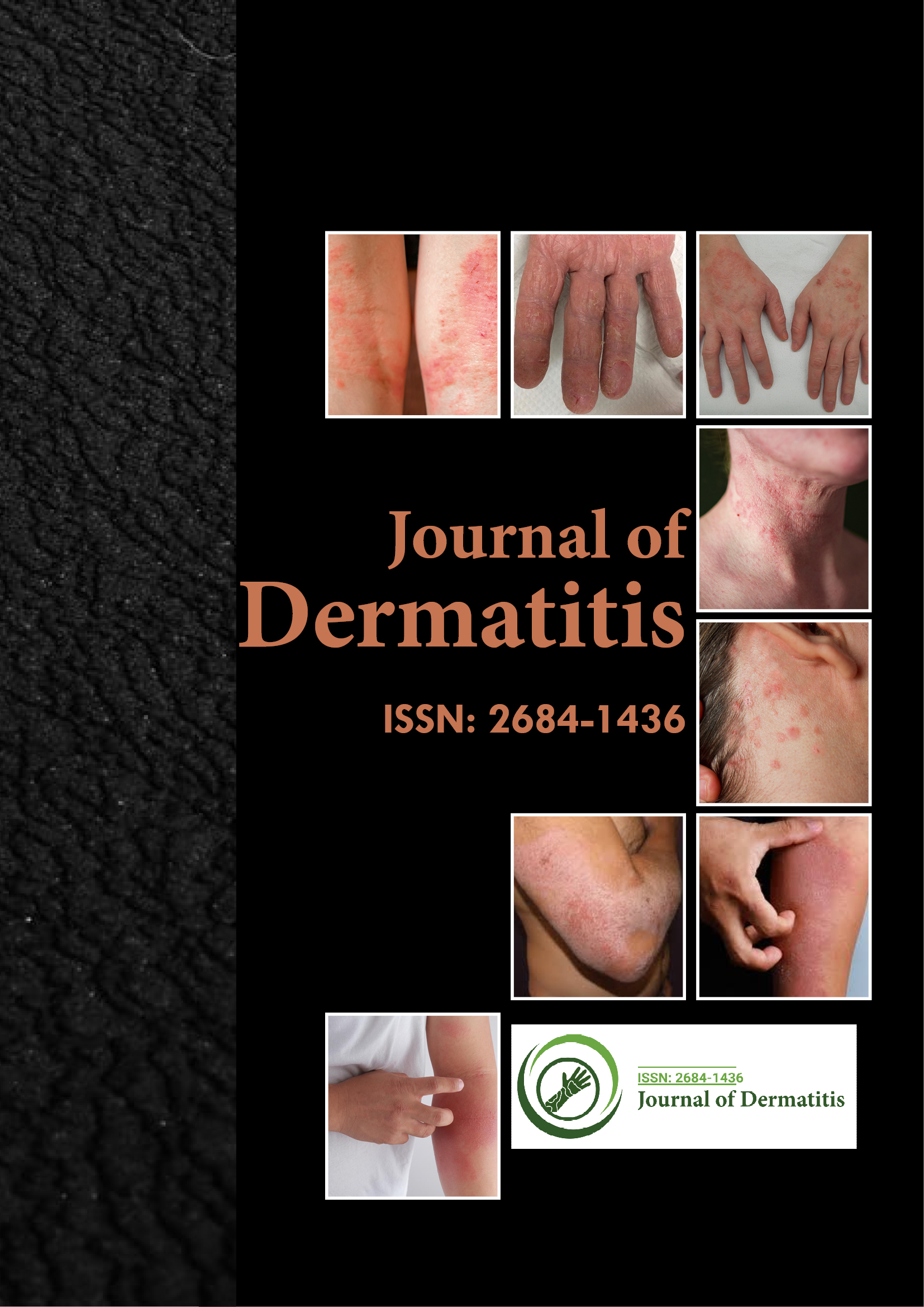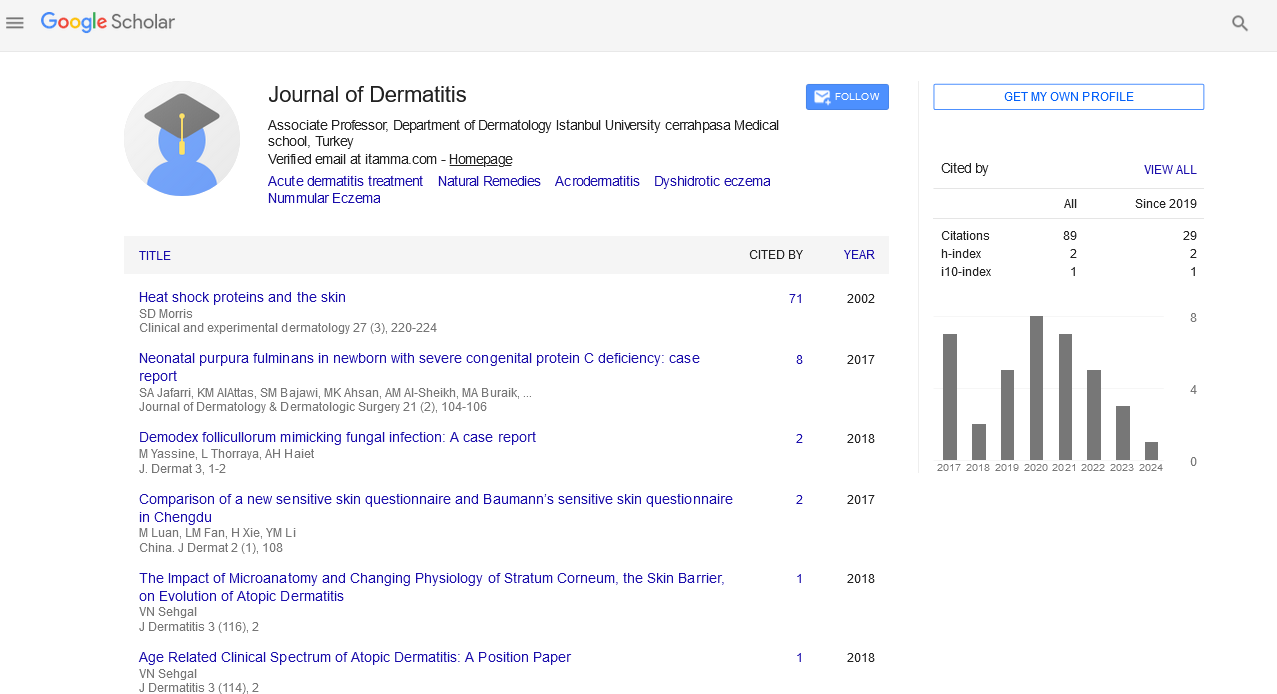Indexed In
- RefSeek
- Hamdard University
- EBSCO A-Z
- Euro Pub
- Google Scholar
Useful Links
Share This Page
Journal Flyer

Open Access Journals
- Agri and Aquaculture
- Biochemistry
- Bioinformatics & Systems Biology
- Business & Management
- Chemistry
- Clinical Sciences
- Engineering
- Food & Nutrition
- General Science
- Genetics & Molecular Biology
- Immunology & Microbiology
- Medical Sciences
- Neuroscience & Psychology
- Nursing & Health Care
- Pharmaceutical Sciences
Perspective - (2024) Volume 9, Issue 3
Restoring Immune Balance in Chronic Skin Diseases through Fecal Microbiota Transplantation
Victor Ivanov*Received: 30-Aug-2024, Manuscript No. JOD-24-27949; Editor assigned: 02-Sep-2024, Pre QC No. JOD-24-27949 (PQ); Reviewed: 16-Sep-2024, QC No. JOD-24-27949; Revised: 23-Sep-2024, Manuscript No. JOD-24-27949 (R); Published: 30-Sep-2024, DOI: 10.35248/2684-1436.24.9.246
Description
Chronic inflammatory skin diseases, such as psoriasis, atopic dermatitis and rosacea, are common, complex conditions that significantly impact the quality of life of millions of individuals worldwide. Despite the availability of various therapeutic approaches, including topical treatments, systemic immunosuppressants and biologics, many of these conditions remain difficult to manage, with relapses often occurring after treatment discontinuation. Given the complex exchange between genetics, environmental factors and the immune system, there is an increasing interest in understanding the role of the microbiome, particularly the gut microbiome, in the pathogenesis of these conditions. Fecal Microbiota Transplantation (FMT), a therapeutic intervention involving the transfer of fecal matter from a healthy donor to a recipient, has surfaced as a novel approach for modulating the gut microbiome, with potential implications for the treatment of chronic inflammatory skin diseases.
The gut-skin axis, a bidirectional relationship between the gut microbiota and skin health, has attracted considerable attention in recent years. Research suggests that dysbiosis, or an imbalance in the composition of the gut microbiome, can contribute to the development and exacerbation of chronic inflammatory skin conditions. This dysbiosis may lead to alterations in immune function, barrier integrity and systemic inflammation, all of which are important factors in the pathogenesis of skin diseases. Consequently, restoring a balanced and variation of the microbiome through interventions like FMT may provide a potential strategy for managing these conditions.
FMT has gained significant traction in the treatment of clostridium difficile infections, where it has demonstrated efficacy in restoring gut microbiota diversity and preventing recurrent infections. More recently, studies have explained the potential of FMT in other diseases, including autoimmune disorders, metabolic conditions and skin diseases. The concept behind using FMT for chronic inflammatory skin diseases is based on the idea that improving gut microbiota composition may help to regulate immune responses and inflammatory pathways that contribute to skin pathology. The success of FMT in conditions like Inflammatory Bowel Disease (IBD), which shares certain immunological features with chronic skin diseases, suggests that similar benefits could be achieved in dermatological contexts.
Beyond psoriasis and atopic dermatitis, there is developing evidence suggesting that FMT could be beneficial for other inflammatory skin conditions, such as acne vulgaris and rosacea. Both conditions have been linked to dysbiosis, with changes in the skin microbiome and gut microbiome contributing to their pathogenesis. Acne vulgaris, for example, is associated with increased levels of pro-inflammatory cytokines and an overgrowth of Cutibacterium acnes, a bacterium that is present in the skin microbiota. Studies on the gut-skin axis have suggested that restoring gut microbiome balance through FMT could reduce systemic inflammation and, in turn, improve acne symptoms. Similarly, rosacea, which is characterized by facial erythema and inflammatory lesions, has been associated with changes in the gut microbiome, particularly with an overgrowth of certain bacteria that may trigger skin inflammation. FMT could potentially provide a novel therapeutic approach to modulate the gut microbiome and reduce rosacea symptoms.
The safety of FMT is a critical consideration, as the transfer of fecal material can carry risks, including the transmission of infectious agents or the introduction of pathogenic microorganisms. Rigorous screening of donors and appropriate preparation of fecal matter are essential to minimize these risks. Additionally, the long-term effects of minimizing the gut microbiome through FMT remain unclear, particularly in individuals with pre-existing health conditions or immune dysregulation. To ensure the safety of FMT in skin diseases, ongoing research must focus on monitoring for adverse effects and determining the best practices for its use in clinical settings.
In conclusion, fecal microbiota transplantation represents an exciting and novel approach for treating chronic inflammatory skin diseases by targeting the gut-skin axis. While the early evidence is encouraging, particularly for conditions like psoriasis, atopic dermatitis and acne vulgaris, further studies are required to fully understand the mechanisms by which FMT modulates immune responses and improves skin health. With careful donor selection, optimal protocols and rigorous safety monitoring, FMT could become an important addition to the therapeutic armamentarium for managing chronic inflammatory skin diseases.
Citation: Ivanov V (2024). Restoring Immune Balance in Chronic Skin Diseases through Fecal Microbiota Transplantation. J Dermatitis. 9:246.
Copyright: © 2024 Ivanov V. This is an open access article distributed under the terms of the Creative Commons Attribution License, which permits unrestricted use, distribution, and reproduction in any medium, provided the original author and source are credited.

